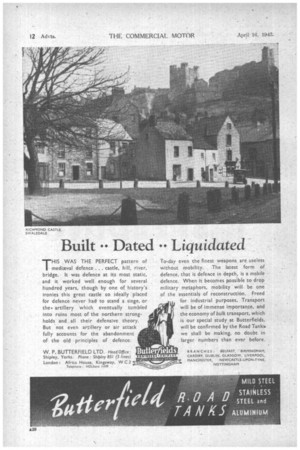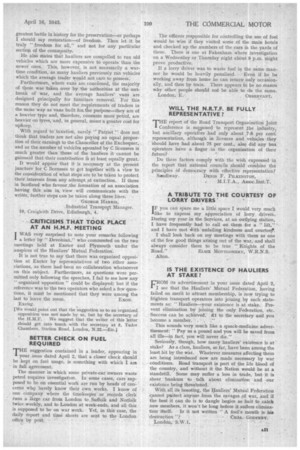Built .• Dated •• Liquidated
Page 22

Page 23

If you've noticed an error in this article please click here to report it so we can fix it.
"'HIS WAS THE PERFECT pattern of
rnedimval defence . castle, hill, river, bridge. It was defence at its most static, and it worked well enough for several hundred years, though by one of history's ironies this great castle so ideally .placed for defence never hadto stand a siege, or theartillery which eventually tumbled into ruins most of the northern strongholds and all their defensive theory. But not even artillery or air attack fully accounts for the abandonment of the old principles of defence.
To-day even the finest weapons are useless without mobility. The latest 'form of defence, that is defence in depth, is a mobile defence. When it becomes possible to drop military metaphors, mobility will be one of the essentials• of reconstruction. Freed for industrial purposes, Transport will be of immense importance, and the economy of bulk transport, which is our special study at Butterfields, will be confirmed by the Road Tanks. we shall be making, no doubt in larger numbers than ever before.
greatest battle in history for the preservation—or perhaps I should say restoration—of freedom. Then let it be truly " freedom for all," and not for any partiCular section of the community. He also states that hauliers are compelled to run old vehicles which are more expensive to operate than the newer ones. This, however, is not necessarily a wartime condition, as many hauliers previously ran vehicleS which the average trader would not care to possess.
Furthermore, where vans are concerned, the majority of tbese was taken over by the authorities at the outbreak of war, and the average hauliers' vans are designed principally for furniture removal. For this reason they do not meet the requirements of traders in the same way as vans built for,ffie purpose—they are of a heavier type and, therefore, consume more petrol, are heavier on tyres, 'and, in general, mean a greater cost for upkeep.
With regard to.taxation, surely" Patriot" does not think that traders are not also paying an equal proportion of their earnings to the Chancellor of the Exchequer, and as the,number of vehicles operated by C licensees is much greater than those of the hauliers it cannot be gainsaid that.their contribution i's at least equally great.
It would appear that it is necessaryat the present juncture for C licensees to get together with a view to the consideration of what steps are to be taken to protect their interests from any attempt at extinction. If those in Scotland who favour the formation of an association having this aim in, view will communicate with the writer, further steps can be taken along these lines.
GEORGE HARRIS,
Industrial Transpoit Manager. 10, Craigleith Drive, Edinburgh, 4.
CRITICISMS THAT TOOK PLACE AT AN H.M.F. MEETING
I WAS very surprised to note your remarks following I a letter by "Devonian," who commented on the two meetings held at Exeter and Plymouth under the auspices of the Hauliers' Mutual Federation.
It is not true to say that there was organized opposition at Exeter by representatives of two other associations, as there had been no collaboration whatsoever on this subject. Furthermore, as questions were permitted only following the speeches, I fail to see how any "organized opposition" could be displayed; but if the reference was to the two operators who asked a few questions, it must be mentioned that they were among the last to leave the room. Exow. Exeter.
[We would point out that the suggestion as to an organized opposition was not made by us, but by the secretary of the H.M.F. We suggest that the writer of this letter should get into touch with the secretary at 6, Tudor Chambers, Station Road, London, N.22.—ED.1
BETTER CHECK ON FUEL REQUIRED THE suggestion contained in a leader, appearing in I your issue dated April 2, that a closer check should be kept on fuel usage, is something with which I am in full agreement.
The manner in which some private-car owners waste petrol requires investigation. In some cases, cars supposed to be on essential work are run by heads of concerns who barely know their own works. I know of one company where the timekeeper or records clerk runs a large car from London to Suffolk and Norfolk twice weekly, and to London at week-ends, and all this is supposed to be on war work. Yet, in this case, the daily report and time sheets are sent to the London office by post. •
The officers respensible for controlling the use of fuel would be wise if they visited some of the main hotels and checked up the numbers of the cars in the yards of these. There is one at Fakenham where investigation on a Wednesday or Thursday night abbot 8 p.m. might prove productive.
If a lorry driver was to waste fuel in the same manner he would be heavily penalized. • Even if he be working away from home he can returxr only occasionally, and then by train. There appears to be no reason why other people should not be able to do the same.
London; E. OBSERVANT.
WILL THE N.R.T.F. BE FULLY REPRESENTATIVE?
THE report of the Road Transport Organization Joint A Conference is supposed to represent Ile industry, but ancillary operators had only about .7-8 per cent. representation, although in licences and vehicles they -should have had about 75 per cent., also did any bus operators have a finger in the organization of their future?
Do these factors comply with the wish expressed in the report that national councils should combine the principles of democracy with effective representation?
Sandiway. DENIS F. PuxixGrox, M.I.T.A., Assoc.Inst.T.
A TRIBUTE TO THE COURTESY OF LORRY DRIVERS
I F you can spare me a little space I would very much like to expresi my appreciation of lorry drivers. During my year in the Services, at an outlying station, I have frequently had to call on them for a "lift," and I have met With unfailing kindness and courtee. I shall look back on my meetings with them as one of the few good things arising out of the war, and shall always consider them to be true "Knights of the Road." ELSIE MONTGOMERY, W.R.N.S. . Alton.
IS THE EXISTENCE OF HAULIERS AT STAKE?
E`ROM its advertisement in your issue dated April 2, I see that the Hauliers' Mutual Federation, having failed on merit to attract membership, is now trying to frighten transport operators into joining by such statements as: "Hauliers—your existence is at stake. Prevent elimination by joining the only Federation, etc. Success can be achieved: AI to the secretary and you become a member. . . ."
This sounds very much like a quack-medicine advertisement: "Pay us a pound and you will be saved from all ills—in fact, you will never die."
Seriously, though, how many hauliers' existence is at stake? As a class, hauliers, so far, have been among the least hit by the war. Whatever measures affecting them are being introduced now are made necessary by war cOnditions. Road transport is part of the life blood of the country, and without it the Nation would be at a standstill. Some may suffer a loss in trade, but it is sheer 'bunkum to talk about elimination and our existence being threatened.
With all its boasting, the Hauliers' Mutual Federation cp.nnot protect anyone from the ravages of war, and if the best it can do is to dangle bogies as bait to catch new members, it won't be long before it suffers elimination itself, Is it not written "A fool's mouth is his destruction ".? . • enAs. Gonsoxv. London, S.W.1.




















































